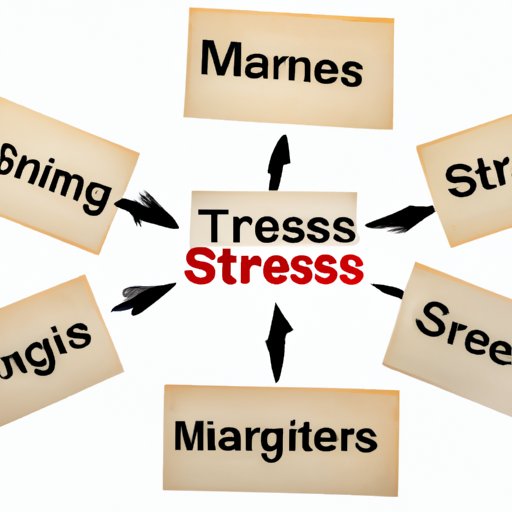
I. Introduction
Stress is a normal part of life, but when it becomes overwhelming, it can have negative effects on our physical and mental health, relationships, and productivity. In today’s fast-paced world, many of us experience stress daily. However, learning how to manage stress effectively can help us lead happier, healthier lives. In this article, we will explore practical strategies for coping with stress and anxiety in our daily lives.
II. 6 Simple and Effective Ways to Manage Stress in Your Daily Life
Here are some simple yet effective strategies for managing stress:
- Take breaks: Take regular breaks throughout the day to relax and recharge. Even a short walk can help boost your mood and energy.
- Practice relaxation techniques: Deep breathing, meditation, yoga, and massage are all excellent ways to reduce stress and promote relaxation.
- Set priorities: Learn to prioritize your tasks and delegate when possible. This can help you avoid feeling overwhelmed and stressed.
- Get enough sleep: Lack of sleep can exacerbate stress and anxiety. Make sure you’re getting enough restful sleep each night.
- Exercise regularly: Regular exercise is not only good for your physical health but also your mental health. It can help reduce stress and improve your mood.
- Practice gratitude: Practicing gratitude by focusing on the good things in your life can help shift your perspective and reduce stress.
These simple tips can go a long way in helping you manage stress in your daily life.
III. Take Control: Ways to Handle Stress and Avoid Burnout
To effectively manage stress, it’s important to take control of your workload and set boundaries. Here are some strategies:
- Manage workload: Learn to say “no” when your workload becomes too much. Prioritize the most important tasks and delegate when possible.
- Set boundaries: Set clear boundaries between work and personal time. Avoid checking work emails or taking work calls outside of work hours.
- Avoid burnout: Burnout can have negative effects on your physical and mental health. Make sure you take time for self-care and relaxation to avoid burning out.
By taking control of your workload and setting boundaries, you can effectively manage stress and avoid burnout.

IV. Breaking the Stress Cycle: Strategies for Coping with Everyday Stressors
Identifying common stressors and learning how to manage them is key to breaking the stress cycle. Here are some tips:
- Identify stressors: Identify common stressors in your life, such as work deadlines or difficult relationships.
- Manage stressors: Learn effective coping mechanisms for managing stressors, such as creating a to-do list or practicing mindfulness.
- Practice self-care: Make sure to prioritize self-care and engage in activities that promote relaxation and stress relief, such as taking a bath or reading a book.
By identifying and managing stressors, you can break the stress cycle and take control of your stress levels.
V. From Breathing Techniques to Mindfulness: 6 Proven Ways to Reduce Stress
Here are some proven techniques for reducing stress:
- Deep breathing: Deep breathing exercises can help slow down your heart rate, reduce muscle tension, and promote relaxation.
- Mindfulness: Mindfulness is the practice of being aware of the present moment. It can help reduce stress and anxiety by focusing your attention on the present and letting go of negative thoughts.
- Progressive muscle relaxation: Progressive muscle relaxation involves tensing and relaxing different muscle groups in your body to promote relaxation.
- Visualization: Visualization involves imagining a peaceful or relaxing scene to promote relaxation.
- Aromatherapy: Essential oils, such as lavender, can help promote relaxation and reduce stress.
- Exercise: Exercise releases endorphins, which can help reduce stress and improve your mood.
These techniques can be practiced anywhere and anytime to promote relaxation and reduce stress.
VI. Coping with Stress: Easy Tips and Tricks for a More Balanced Life
Here are some easy tips for coping with stress and achieving balance in your life:
- Stay organized: Create a schedule or to-do list to help you stay on track and prioritize tasks.
- Plan ahead: Plan ahead for stressful events, such as deadlines or family gatherings, to reduce anxiety and stress.
- Take breaks: Take regular breaks throughout the day to relax and recharge.
- Incorporate leisure activities: Make time for activities that bring you joy and relaxation, such as reading, painting, or spending time with loved ones.
- Eat a healthy diet: Eating a balanced diet can help reduce stress and improve your overall health.
By incorporating these easy tips into your daily life, you can achieve balance and effectively manage stress.
VII. Reclaim Your Calm: Tried and Tested Approaches to Managing Stress and Anxiety
Stress and anxiety often go hand in hand, but there are strategies that can help. Here are some tried and tested approaches:
- Cognitive-behavioral therapy: Cognitive-behavioral therapy can help you identify negative thinking patterns and replace them with more positive ones.
- Medication: Medication can be helpful in managing severe stress and anxiety, but should be used under the guidance of a healthcare professional.
- Relaxation techniques: Relaxation techniques, such as deep breathing and yoga, can help reduce stress and anxiety.
- Talk to a professional: If you’re struggling to manage stress and anxiety on your own, seek the help of a mental health professional.
- Self-help techniques: In addition to professional help, self-help techniques, such as journaling and practicing gratitude, can be effective in managing stress and anxiety.
By seeking professional help and practicing self-help techniques, you can effectively manage stress and anxiety.
VIII. Conclusion
Stress can have negative effects on our physical and mental health, relationships, and productivity. However, by learning practical strategies for managing stress and anxiety, we can lead happier, healthier lives. From taking breaks and practicing relaxation techniques to seeking professional help, there are many ways to effectively manage stress in our daily lives. So take action and start incorporating these coping techniques into your life to achieve balance and reclaim your calm.





